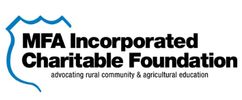Thank You Show-Me Level Sponsors!





.png/:/cr=t:0%25,l:0%25,w:100%25,h:100%25/rs=h:100,cg:true)
Highlights from the 2026 Mo Ag Stewardship Conference

Support Local
Connect directly with farmers, students, and ag professionals seeking real-world education.
Limited sponsor opportunities are available for businesses looking to make an impact while building brand recognition where it matters most.
Contact Brittany Hemme, Advisor at 660-674-2220 or email agrileadersf@gmail.com
The 2025 Mo Ag Stewardship Conference was another great success!










Support from our top-tier sponsors is critical in helping us create a robust Conference each year. We appreciate the Show-Me Level sponsors for all they do to support this event and our organization!

Thank you Santa Fe & Concordia FFA Chapters! We are strong supporters of youth in Ag. Each year we enlist the help of local FFA members to be part of the Conference and earn money for their Chapter!
Speaker Lineup for 2025

Jason Mauck
Producer from Indiana who raises hogs, corn, soybeans and wheat. He has built a system called relay-cropping; planting one crop into an existing growing crop, typically on 60" rows. He touts harvesting 108 bushel soybeans, grown between rows of wheat, which he's had yield around 100 bushels before as well. Mauck knows how to utilize sunshine and plant relationships to raise multiple cro

Taylor Braungardt
Agronomist from Missouri who helps farmers through education and field days to better understand plant health through nutrition. Taylor has operated Braungardt Ag Solutions with his family since 2011.

Jeff Jackson
Jeff has more than 15 years experience as a forage specialist and has been working with producers to help them create and implement forage mixes, stored forage options and other ways to help producers feed their livestock year-round.

Monte Bottens
Monte has deep roots in agrilculture as a fifth generation farmer in Northwest Illinois. At Bottens Family Farm he practices long term no-till, cover crops, and has integrated fence-less grazing with his livestock. He grows non-GMO seed, food grade corn and soybeans along with small grains, specialty crops, hay, and grazing crops. He is the owner of Grateful Graze, a direct to consume

Laura Valli is the social sciences postdoctoral fellow at the MU Center for Regenerative Agriculture, looking at the effect of digital technologies on the adoption of more sustainable farming approaches. Before joining the Center, Laura was a doctoral student at Washington State University Breadlab in Skagit, WA. In her Ph.D. dissertation, Laura discussed the meaning of rye for various interest gr
speaker slides 2024
We are waiting on Russell Hedrick's slides. As soon as we receive them, we will upload them. Thank you for your patience.
Meet the 2024 Speakers

Russell Hedrick, a first-generation no-till farmer from North Carolina, made history with his 2022 harvest, shattering the record for dryland corn with a yield of 459.1 bushels. He is known for being innovative and having an unconventional no-till approach. He first tried his hand at row crops in 2012 to 30 acres. Today, he has grown his operation to more than 800 acres.

Dr. Jerry Hatfield is the recently retired director for the USDA-ARS National Laboratory for Agriculture and The Environment. His focus is on the role of management practices that enhance soil health to increase the efficiency of agricultural systems in the use of natural resources and positively impact ecosystem services. Hatfield graduated from Kansas State University in 1971 with a B.S., Univ

Jeremia Markway ranches with his family at Markway Ranch, located in central Missouri, where they raise hair sheep, cattle, Quarter horses and custom graze others' livestock. Most recently he managed research farms at Lincoln University in Jefferson City for eight years. His interest in managed grazing took off when his parents built the first electric fence in 1983. Since then it has been a never
2024 Show-Me Level Sponsors





PAST MO AG STEWARDSHIP CONFERENCES






2023 Mo Ag Stewardship Conference Featured speakers
Phil Needham
David Kleinschmidt
Drexel Atkisson

Phil is no stranger to learning new things, after moving to the US in 1989, he pioneered record-breaking wheat yields and grew a business out of trying new technologies on planters. Hear insights on how to grow your wheat yield and learn how to optimize your planter set up.
Drexel Atkisson
David Kleinschmidt
Drexel Atkisson

Drexel is a life long Missourian who has dedicated 3 decades of service to producers through is work at NRCS. His years of helping producers, as well as implementing regenerative practices on his own farm, have developed into a depth of understanding in service to others.
David Kleinschmidt
David Kleinschmidt
David Kleinschmidt

David has worked on both sides of the aisle, from ag retail sales to now running his own agronomy consulting business since 2018. He has worked with producers all over the country to not only improve their profitability, but to boost their understanding of how soil functions in order to continuously improve their farm land.
Copyright © 2026 SFAL - All Rights Reserved.
This website uses cookies.
We use cookies to analyze website traffic and optimize your website experience. By accepting our use of cookies, your data will be aggregated with all other user data.



















